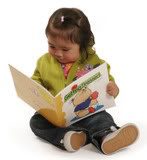
How To Raise A Reader

As we celebrate Read Across America Week and honor the legacy of Dr. Seuss, let us embrace innovative approaches to early literacy that promote communication, engagement, and inclusion. Baby Signs® not only enhances language development and literacy skills but also fosters a deeper connection between caregivers and children through the shared joy of reading. By incorporating sign language into our reading routines, we empower young learners to express themselves, explore the world of books, and embark on a lifelong journey of learning and discovery. So, let’s sign, read, and celebrate the magic of literacy together this Read Across America Week and beyond!
Check out this great article from Parents.com featuring Dr. Linda Acredolo.
Settling into a comfy chair with your child to read a story is one of the best things about being a parent. And if you haven’t already made reading a daily habit, you need to start now, since books benefit kids in so many ways. “First of all, reading with your child is a wonderful bonding experience,” says Parents advisor Linda Acredolo, PhD, coauthor of Baby Minds. Your kid gets to bask in your undivided attention, which makes story time truly magical. Reading every single day also helps your child learn to talk, expand her vocabulary, build her imagination, and get prepped for school. Our expert tips will get your child hooked on books for life.

Reading with Babies
You can’t start the reading habit too early. At 3 to 6 months, your baby will be more interested in chewing her board books, but by the end of her first year, she’ll probably pick out favorites.
What They Learn
When you turn pages with your baby in your arms, she’ll associate books with snuggling. “As an infant, she’s learning to value books because it means she gets to cuddle with her mom or dad,” says Dr. Acredolo. But most important, reading to a young baby ultimately helps her learn to talk. She begins to connect pictures with words. At 9 months, she’ll be able to home in on your tone of voice, cadence, and the length of sentences. “Parents help a baby learn language by speaking to her often, with varied vocabulary and about topics she finds interesting,” says Parents advisor Kathleen McCartney, PhD, professor of early-childhood development at Harvard Graduate School of Education.
Make Reading Fun
- Go for the right touch (and taste!). Babies learn through their senses, so buy cardboard or cloth books that they can put in their mouth.
- Face it. Infants love looking at pictures of faces, especially those of other babies.
- Be silly. Is there a phone in the story? Say, “Ring, ring. Hello? I’m sorry Olivia can’t take your call; she’s in a meeting.”
- Point out things in the real world. When you’re taking a walk, talk about stuff you’ve read about in books. “See the doggie?” This will help her begin to associate the word “dog” with her picture book and the live creature in front of her.
By Kim Ratcliff September 2009
The Power of Baby Signs® in Early Literacy:
Baby Signs® is not just about teaching sign language; it’s about empowering infants and toddlers to communicate their needs, thoughts, and feelings long before they can speak verbally. By introducing simple signs for common words like “more,” “eat,” and “book,” parents and caregivers enable young children to express themselves effectively, reducing frustration and enhancing their confidence.
Research has shown that babies who learn sign language through programs like Baby Signs® often develop larger vocabularies and stronger language skills than their peers who rely solely on verbal communication. This early exposure to sign language lays a solid foundation for literacy development by fostering an understanding of language structure, grammar, and communication cues.
Moreover, the interactive nature of Baby Signs® encourages meaningful engagement between caregivers and children during reading sessions. As parents incorporate signs related to the story into their reading routine, they create multisensory experiences that captivate young minds and deepen their comprehension of the narrative. This holistic approach to literacy not only enhances language skills but also instills a lifelong appreciation for the magic of storytelling.
Visit our website, BabySigns.com to learn more about the Baby Signs® Instructor Program or email info@babysigns.com.
